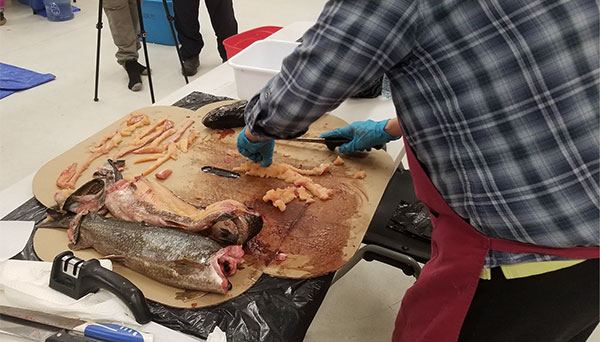Dene Béré Harvesting Programs for Women and Youth
Organization: Sahtú Renewable Resources Board
The Ɂehdzo Got’ı̨nę Gots’ę́ Nákedı (Sahtú Renewable Resources Board) works with Ɂehdzo Got’ı̨nę (Renewable Resources Councils) to maintain Dene and Métis harvesting traditions and keep the land and animals healthy for future generations.
Location: Communities in the Sahtú region of the Northwest Territories: Deline, Tulita, Fort Good Hope, Norman Wells, and Colville Lake.
Country: Canada
Other Organizations Involved: -Ɂehdzo Got’ı̨nę (Renewable Resources Boards) in all 5 Sahtú communities: Behdzı Ahda Ɂehdzo Got'ı̨nę (Colville Lake Renewable Resources Council); Tulı́t'a Ɂehdzo Got’ı̨nę (Renewable Resources Council); Norman Wells Renewable Resources Council; Délı̨nę Ɂehdzo Got’ı̨nę (Deline Renewable Resources Council); Fort Good Hope Ɂehdzo Got’ı̨nę (Renewable Resources Council)
 ©Sahtú Renewable Resources Board
©Sahtú Renewable Resources Board
Background
Food insecurity greatly affects northern Indigenous populations, and will worsen with climate change. Climate change lowers traditional food access, availability, and quality, and therefore food security. Traditional foods include harvested wildlife, so changes in migration patterns and availability threaten food security. Climate change impacts market food prices without all-season road access, affecting all 5 Sahtú communities. The high cost and lower nutrition of market foods coupled with the decreasing availability of country food sources is concerning and negatively impacts food security in the NWT.
These challenges are rooted within the communities, so strategies to address them must be community driven. This proposal includes a gender-based component to support Dene and Métis women with “safe spaces” to share their stories and develop an understanding of their roles in Dene béré (country food) system, and a youth mentorship program to prepare the younger generation to use the land in ways to cope with climate change challenges.
Goals
There are two main project goals:
- Increase traditional knowledge and skills transfer to youth and women in local food systems in the climate change context.
- To improve food security in the North and help each community adapt to climate change, while promoting traditional knowledge.
Main activities
This project directly benefits Dene and Métis women and youth, however communities and families ultimately benefit from this program through knowledge sharing and skills transfer of local food systems.
- Develop communication material to promote the program in each Sahtu community.
- Create a mentorship program for youth in each community for traditional food systems skills transfer, to gain understanding of food security, and knowledge of traditional environment.
- Engage with Dene and Métis women in each community by creating spaces for woman to discuss and share knowledge of food systems and impacts of climate change on food security in the community.
- Evaluate the success of the program through survey dissemination and final report to support sustainable funding towards the program.
Outcomes
N/A